The ‘deep human rights crisis’ hanging over Nicaragua’s elections
President Daniel Ortega is set to win a fourth straight term, but rights groups say November 7 vote is not free or fair.
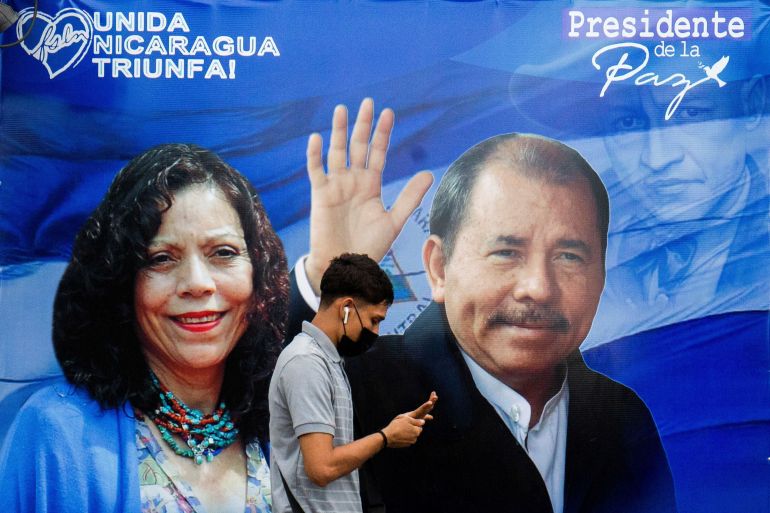
Nicaragua is holding general elections after a months-long campaign mired by controversy, including a widely denounced wave of arrests of opposition leaders and presidential hopefuls.
President Daniel Ortega, who is running virtually unopposed, is poised to win a fourth consecutive term in office on Sunday.
Keep reading
list of 3 itemsNicaragua police arrest editor of newspaper critical of Ortega
Nicaragua cancels permits for US, European NGOs
But the longtime leader, who was denounced just days before the vote as a “dictator” by the European Union’s foreign policy chief, has overseen what rights groups and international observers have said is a government campaign to stifle dissent.
In the lead-up to the election, Ortega’s administration detained 40 opposition figures, including seven potential presidential candidates, and the United States and EU have denounced the contest as a sham.
Rights groups said the current conditions in the Central American nation were not conducive to free and fair elections.
“These elections are taking place in the context of a deep human rights crisis,” Astrid Valencia, Central America researcher at Amnesty International, told Al Jazeera. “There is deliberate strategy on the part of the Nicaraguan government to persecute and punish any opposition – eliminating the possibility of the exercise of a real political process.”
Here’s what you need to know ahead of the November 7 vote:
How will the vote work?
Nicaraguans will vote for president and vice president, as well as elect members of the country’s 92-seat National Assembly.
Some 4.5 million people are eligible to vote, according to local media, but it is unclear how many will actually cast their ballots as dissident groups in exile this week called on Nicaraguans to boycott the election.
The new administration is expected to take office on January 10 for a five-year mandate.
Ortega’s Sandinista National Liberation Front (FSLN) and five other minority political parties – the Constitutional Liberal Party, the Independent Liberal Party, the Nicaraguan Liberal Alliance, the Nicaraguan Christian Way, and the Alliance for the Republic – are participating.
The parties are popularly called “zancudos” – or mosquitoes – small political parties with few known candidates who are friendly or allied with the ruling government.
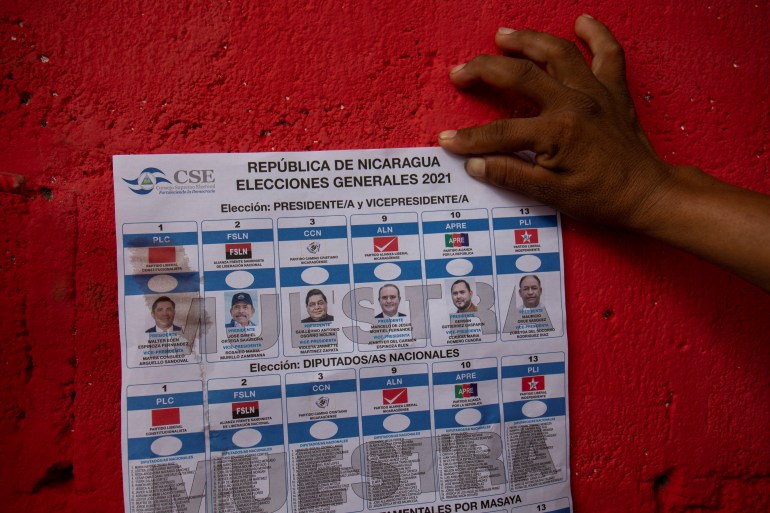
Who is Daniel Ortega?
Ortega, 75, is running for re-election alongside his wife Rosario Murillo, who is seeking the vice presidency.
Ortega, a former Marxist fighter and leader of the leftist FSLN, governed Nicaragua from 1979 to 1990 before returning to power in 2007.
The FSLN overthrew the US-backed dictatorship of Anastasio Somoza in 1979 and established a revolutionary government. Ortega then won 1985 presidential elections that international observers said were free and fair. He then unsuccessfully ran for president in 1990, 1996 and 2001.
Human rights groups have said Ortega has increasingly moved towards authoritarianism since 2007, as his government started cracking down on dissent, free speech and civil society groups.
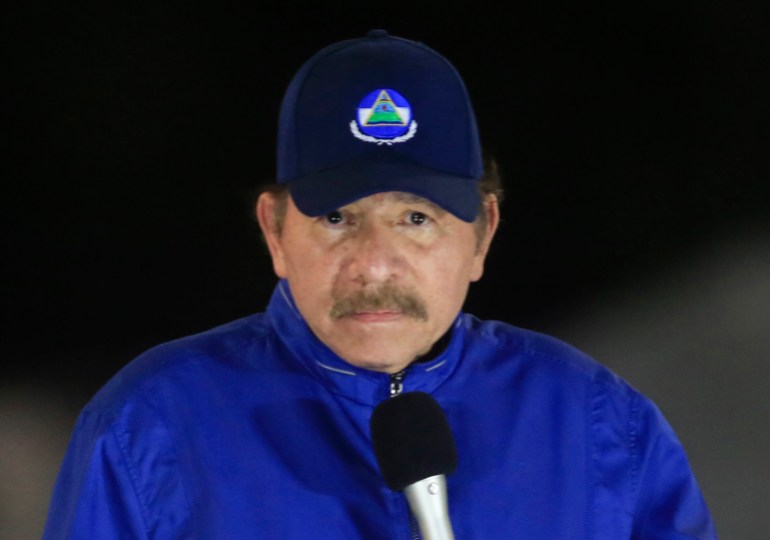
When did the crisis begin?
Political analysts said the latest crisis began in April 2018, when student-led demonstrations broke out across the country after Ortega announced plans to cut pensions and raise taxes.
The reforms were cancelled later that month but the government launched a violent crackdown on the demonstrations.
According to the Inter-American Commission on Human Rights (IACHR), 328 demonstrators were killed and 1,614 others were arrested, with many subjected to ill-treatment and torture while in detention. The IACHR said 136 people remain in prison and more than 103,600 have fled the country and gone into exile, most to Costa Rica.
The most recent wave of arrests of opposition figures, activists and journalists began in June.
Several of the detainees were charged with treason or money laundering. But critics have said the charges have been trumped up and aimed at keeping them out of the race.
“The government has charged many with serious crimes without providing substantiating evidence, strongly suggesting that these are politically motivated persecutions in retaliation for opposing the government,” Human Rights Watch (HRW) said in September.
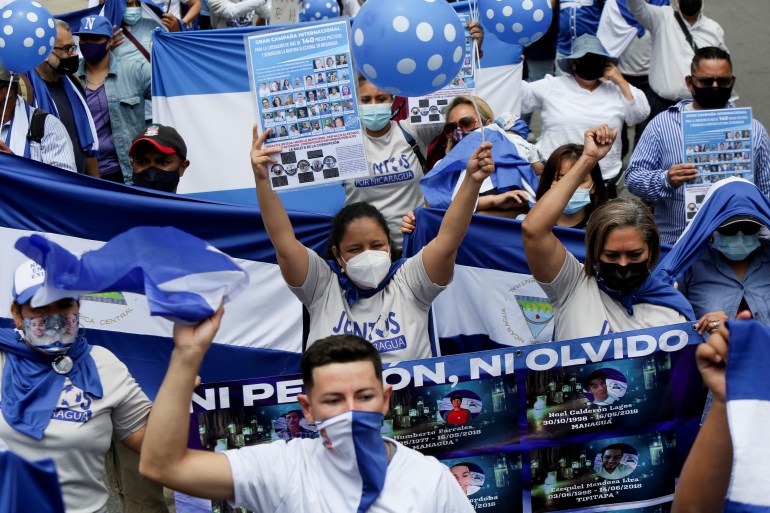
Who has been arrested?
Opposition leader Cristiana Chamorro, 67, the daughter of former President Violeta Chamorro, was arrested in early June and charged with money laundering.
The former journalist had intended on running at the top of a unified opposition ticket and was widely seen as a favourite to defeat Ortega. However, citing the charges against her, a court granted prosecutors’ request to bar her from running for president or from holding public office.
Chamorro, who has denied the money laundering allegations, has been under house arrest since June 2.
The arrests of other presidential hopefuls soon followed. Arturo Cruz, Felix Maradiaga, Juan Sebastian Chamorro, Miguel Mora, Medardo Mairena and Noel Vidaurre have been arrested and prevented from running.
Former Ortega allies, including Hugo Torres, a retired Sandinista general who rescued Ortega from prison in the 1970s and who served under him until the 1990s, have also been arrested. “The detentions are a message from Ortega,” Al Jazeera’s Latin America editor Lucia Newman explained in June, that “no one is off-limits, regardless of their revolutionary credentials.”
Meanwhile, dozens of other activists and opposition figures have fled Nicaragua, including Chamorro’s brother, prominent journalist Carlos Fernando Chamorro.
The Supreme Electoral Council, Nicaragua’s electoral body, also banned three opposition parties from running, accusing them of violating electoral laws. Congress later outlawed 45 civil society groups, including six foreign NGOs, from operating in Nicaragua.
What has Ortega said?
Ortega has defended his government’s actions, saying the opposition figures were not candidates but rather “criminals” and “terrorists” who pose a danger to the country. He said their arrests were carried out in accordance with the law.
The president has accused several of his critics of being aligned with the US and accused them of seeking to destabilise the country and topple his government.
What laws are being used to detain people?
Michelle Bachelet, the United Nations High Commissioner for Human Rights, said on June 22 that most of the arrests were carried out in accordance with two pieces of legislation: “Law 977 against money laundering, financing of terrorism” and “Law 1055 on the defence of the rights of the people to independence, sovereignty and self-determination for peace”.
Law 1055, known as “the sovereignty law,” was passed by the Nicaraguan Congress last year, prompting criticism from Ortega’s critics and international observers. It allows the authorities to hold detainees for up to 90 days.
“My Office and several human rights mechanisms had already warned that these laws could be used to persecute opponents, as is indeed happening,” Bachelet said.
She also said investigations by the Nicaraguan prosecutor’s office into some of the arrestees “undermine their rights to personal liberty, to the presumption of innocence and to effective remedy. This would prevent them from standing in the general elections, restricting not only their political rights, but also the rights of citizens to be able to vote for the candidates of their choice.”
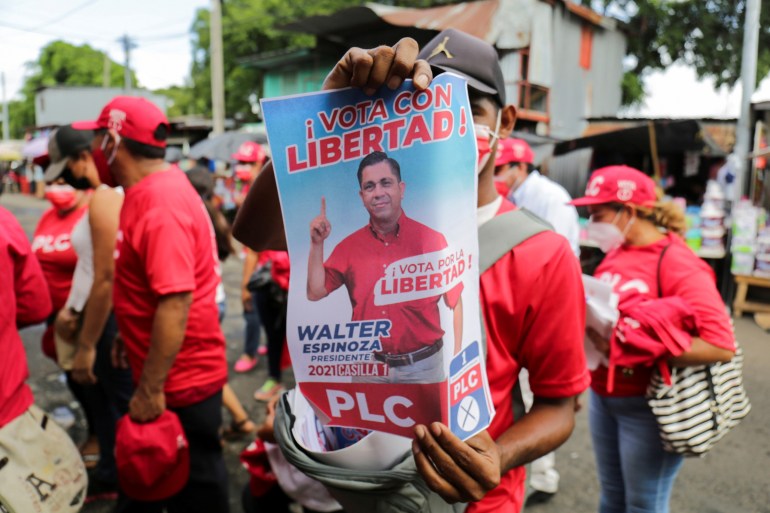
How has Ortega responded to the criticism?
Ortega has remained defiant, including in the face of international sanctions, which he recently said would not “subdue” Nicaragua as the nation “has gone through much more difficult times, much harsher”.
In a speech in September marking the country’s independence, Ortega said he wished to maintain good relations with all the countries of the world, but “the only thing we ask is that they respect us.”
Michael Campbell, a political adviser to Ortega, defended the elections in an online meeting of the Organization of American States on Wednesday. He accused those criticising Nicaragua’s electoral process of seeking to overthrow the government “and feeding terrorism as a formula to destabilise national sovereignty”.
What have rights groups said?
Jose Miguel Vivanco, Americas director at HRW, in September said, “Ortega’s rush to detain critics in horrendous conditions on spurious grounds and without due process ahead of the November elections shows that he has no intention of losing”.
In a joint statement on Wednesday, UK-based rights group Amnesty International and other US and international organisations said the elections were being held “in the context of serious restrictions on civil and political liberties”.
“We are heading to elections on Sunday where there are no guarantees to exercise political rights, where the government has taken a hold of all institutions in order to ensure that [Ortega] retains a grip on power,” Valencia, at Amnesty International said.
Valencia said Ortega winning another term in office will mean that “the structures that have permitted, promoted and ensured impunity and repression will continue” in the country.
Last week, the IACHR also issued a report (PDF) saying the circumstances in Nicaragua are not conducive to “free, fair, transparent and plural elections”.
How have other countries responded?
US Secretary of State Antony Blinken last month said Ortega’s administration is holding “a sham election devoid of credibility” that is aimed at establishing “an authoritarian dynasty unaccountable to the Nicaraguan people”.
On Wednesday, the US House of Representatives passed a bill that calls for more sanctions on Nicaraguans deemed responsible for overseeing the elections. It must still be signed by President Joe Biden.
The measures include increasing – in coordination with Canada, the EU and Latin American and Caribbean countries – a number of US sanctions against people involved in human rights abuses and the obstruction of free elections.
The US earlier issued a series of sanctions and visa restrictions on Nicaraguan officials, as well.
On Tuesday, the EU’s foreign policy chief Josep Borrell described the election as “fake” and only aimed at keeping Ortega, whom Borrell described as a “dictator”, in power. The EU has issued its own set of sanctions against Nicaraguan officials, including against Ortega and his wife, prohibiting them from travelling to or transiting through the bloc, as well as freezing any of their assets.